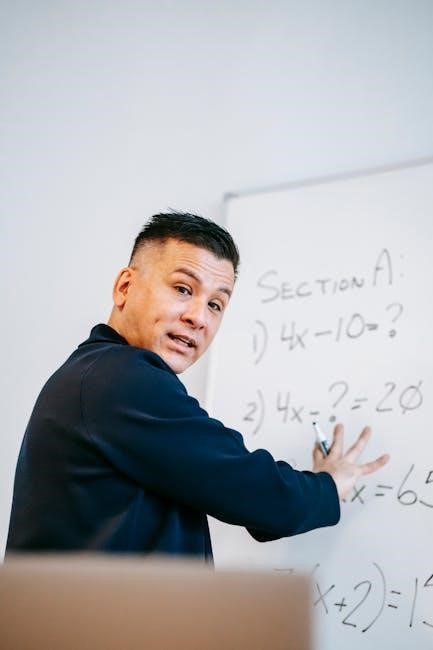Differential equations and linear algebra are foundational in mathematics, offering tools to model real-world phenomena․ This 4th edition textbook integrates theory with practical applications, emphasizing computational and qualitative approaches to solve complex problems across various disciplines․ The updated content includes fresh examples, problems, and applications, making it an essential resource for students and instructors seeking a comprehensive understanding of these subjects․
Overview of the 4th Edition
The 4th edition of Differential Equations and Linear Algebra offers a refined blend of theory and application, designed to enhance student understanding․ It incorporates updated problems, examples, and applications, reflecting modern computational and qualitative approaches․ The textbook emphasizes real-world relevance, making it accessible to students from diverse academic backgrounds․ With its comprehensive coverage and structured learning tools, this edition serves as a valuable resource for both introductory and advanced learners in mathematics, engineering, and related fields․ The updated content ensures students are well-equipped to tackle complex problems with confidence and accuracy․
Importance of the Textbook in Mathematics Curriculum
Differential Equations and Linear Algebra, 4th Edition is a cornerstone in mathematics education, bridging theory and application seamlessly․ It equips students with essential tools to model and analyze dynamic systems, crucial in fields like engineering, physics, and economics․ The textbook’s structured approach ensures a deep understanding of core concepts, preparing students for advanced studies and real-world challenges․ Its inclusion in curricula enhances problem-solving skills, fostering critical thinking and mathematical proficiency․ This makes it indispensable for undergraduate programs aiming to develop well-rounded mathematicians and scientists capable of addressing complex, interdisciplinary problems effectively․

About the Authors and Publication
Stephen W․ Goode and Scott A․ Annin authored the 4th edition, published by Pearson on January 6, 2016, offering comprehensive insights into differential equations and linear algebra․
Stephen W․ Goode and Scott A․ Annin
Stephen W․ Goode and Scott A․ Annin are renowned authors and professors at California State University․ Their collaborative effort resulted in the 4th edition of Differential Equations and Linear Algebra, published by Pearson․ This comprehensive textbook spans 871 pages, blending theoretical foundations with practical applications․ Goode and Annin’s expertise ensures clarity and depth, making the material accessible to students․ The updated edition reflects their commitment to modernizing the curriculum, incorporating fresh problems and real-world examples․ Their work is widely recognized for its educational value, providing students and instructors with a robust resource for learning and problem-solving in these critical mathematical fields․
Publication Details and Edition History
The 4th edition of Differential Equations and Linear Algebra was published by Pearson on January 6, 2016․ This updated version spans 871 pages, offering a comprehensive study of differential equations and linear algebra․ The ISBN for this edition is 978-0-13-449718-1․ It is an authorized adaptation of the U․S․ edition, ensuring global accessibility for students and educators․ The textbook has undergone revisions to include fresh problems, applications, and examples, reflecting the authors’ commitment to modernizing the curriculum․ This edition is widely recognized for its clarity and depth, making it a valuable resource for both undergraduate and graduate-level studies in mathematics and related fields․

Key Features of the 4th Edition
The 4th edition features updated problems, fresh applications, and a blend of computational and qualitative approaches to enhance learning․ It provides modern tools for solving real-world problems effectively․
Updated Problems and Applications
The 4th edition includes a wide range of updated problems and applications, reflecting real-world scenarios and modern advancements․ These exercises vary in difficulty, catering to both novice and advanced learners․ They are designed to reinforce theoretical concepts and encourage critical thinking․ The applications span multiple disciplines, making the content relevant and engaging for students from diverse academic backgrounds․ This updated approach ensures that learners can apply their knowledge to practical situations, bridging the gap between theory and practice effectively․
Computational and Qualitative Approaches
The 4th edition integrates computational and qualitative methods to provide a balanced approach to learning․ It incorporates numerical techniques and graphical interpretations, enabling students to explore solutions both analytically and visually․ The text emphasizes understanding the behavior of mathematical models, combining traditional theory with modern computational tools․ This dual focus ensures that students grasp not only how to solve equations but also how to interpret and apply their solutions in real-world contexts․ The blend of computational and qualitative approaches makes the material accessible and prepares learners for practical problem-solving in various fields․

Resources for Learning and Problem Solving
The 4th edition provides extensive resources, including solution manuals and study guides, to aid students in mastering differential equations and linear algebra․ Online platforms offer additional support through homework help and interactive tools, ensuring a comprehensive learning experience․
Solution Manuals and Study Guides
The 4th edition provides comprehensive solution manuals and study guides to help students master differential equations and linear algebra․ These resources include detailed solutions to chapter exercises, offering clarity on complex problems․
Additionally, study guides provide tips and strategies for effective learning, ensuring a deeper understanding of the material․ Both resources are designed to support students in their academic journey, making them invaluable companions to the textbook․ They are available online, providing easy access for learners seeking to enhance their problem-solving skills and grasp key concepts efficiently․
Online Resources and Homework Help
The 4th edition offers extensive online resources to aid students in mastering differential equations and linear algebra․ These include homework help platforms with detailed solutions to chapter exercises, enabling students to understand complex problems better․ Additionally, online forums and educational websites provide supplementary materials such as practice problems, video tutorials, and interactive tools․ These resources are designed to support independent learning and enhance problem-solving skills․ They are easily accessible and serve as valuable companions for students seeking to deepen their understanding of the subject matter․

Accessing the Differential Equations and Linear Algebra 4th Edition PDF
The 4th edition PDF is available through authorized sources like Pearson’s official website, online retailers, and academic platforms․ Ensure legality by purchasing from verified providers․
Authorized Adaptations and Availability
The 4th edition of Differential Equations and Linear Algebra is available as an authorized adaptation from the U․S․ edition, with ISBN 978-0-13-449718-1․ This version ensures compatibility with global academic standards while maintaining the original content’s integrity․ The PDF is widely accessible through Pearson’s official website, authorized retailers, and select academic platforms․ Students and educators can also access it via university libraries or e-learning portals․ Always verify the source to ensure legality and quality, avoiding unauthorized adaptations that may compromise content accuracy or violate copyright laws․
Legal and Educational Sources for the PDF
The 4th edition of Differential Equations and Linear Algebra is legally available through Pearson’s official website, authorized retailers, and select educational platforms․ Students can access the PDF directly from these sources, ensuring compliance with copyright laws․ Additionally, many universities provide access to the e-book through their libraries or online learning systems․ Always prioritize purchasing or accessing the material from verified sources to avoid unauthorized copies and support the publisher and authors․ This ensures you receive the complete, high-quality content designed for academic success․
The 4th edition of Differential Equations and Linear Algebra is a comprehensive and effective textbook for understanding these essential mathematical disciplines․ It blends theory with practical applications, ensuring students develop strong problem-solving skills․ The updated content and resources make it an invaluable tool for both learning and teaching․ This edition is widely regarded for its clarity and depth, making it a must-have resource for anyone studying differential equations and linear algebra․
Final Thoughts on the Textbook’s Value
The 4th edition of Differential Equations and Linear Algebra is a valuable resource for students and educators․ Its updated problems, applications, and computational approaches provide a comprehensive learning experience․ The textbook effectively bridges theory and practice, making complex concepts accessible․ With its clear explanations and robust support materials, it stands out as an essential tool for mastering these subjects․ The integration of qualitative and quantitative methods enhances understanding, while the availability of online resources and study guides further enriches the learning journey․ This edition is a testament to the evolution of mathematical education․
Recommendations for Students and Instructors
Students and instructors are encouraged to utilize the 4th edition of Differential Equations and Linear Algebra for its comprehensive coverage and updated resources․ Encourage active problem-solving using the varied exercises, and leverage the solution manuals and online tools for additional support․ Instructors can benefit from the structured approach and adaptable difficulty levels to cater to diverse learning needs․ Regular practice and review of key concepts are recommended to maximize understanding․ This textbook is an invaluable companion for anyone seeking to excel in these fundamental areas of mathematics․